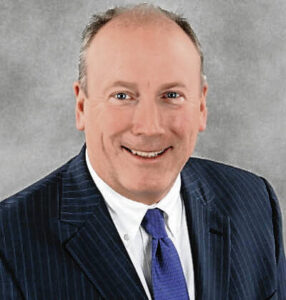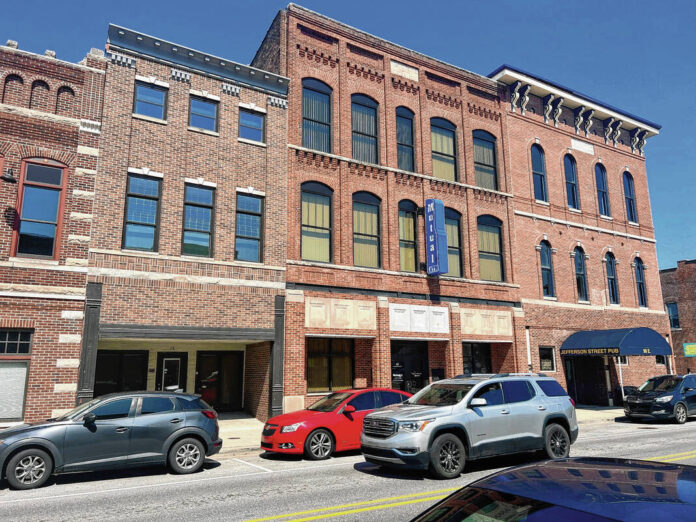A local bank CEO says the collapse of two large banks in the U.S. this month likely won’t have a ripple effect on independent, community banks both in Franklin and across Indiana.
David Coffey, president and CEO of Franklin-based Mutual Savings Bank, was, like any banker, concerned three weeks ago when he heard of the closure of the Silcon Valley Bank, and New York’s Signature Bank two days later.
“Because it happened, it affected the banking industry, and it affects the concerns of customers just about banking in general,” Coffey said. “Not because of us, but just because it happened and they see it, they might have questions.”
The second-largest banking collapse in the U.S. to date rattled the public faith in banks, and caused the federal government to rush to remedy the situation.
While he can’t predict the future or hypotheticals, Coffey remains confident in the state of local community banking, and banks the average customer uses. Mutual Savings, along with other banks in Indiana, is conservative, well-capitalized and has a lot of liquidity resources.
“We’re resilient. Our bank has been around since 1890,” Coffey said. “My predecessors have seen this bank through world wars, conflicts of all kinds, the Great Depression and the Great Recession.”
Americans nationwide have lost confidence in banks following these failures. A poll released by the Associated Press-NORC Center for Public Affairs Research last week showed only 10% of U.S. adults say they have high confidence in the nation’s banks and other financial institutions. That percentage is down from the 22% who said they had high confidence in 2020.
While only 10% have high confidence in the nation’s banking institutions, 57% of Americans have some confidence; 31% have hardly any. Also, 56% say the government isn’t doing enough to regulate banks and other financial institutions, while 27% say it’s doing the right amount and 15% say it’s regulating too much.

Coffey wants people to keep in mind that both Silicon Valley Bank and Signature Bank had a niche. SVB was in the tech world, and Signature had ventured into cryptocurrency, both generally volatile markets. These were also very large banks, SVB was the 16th largest in the country.
Silocon Valley Bank’s customers were largely venture capital-backed startups and other tech-centric companies that needed more cash over the past year, so they began withdrawing their deposits. Silicon Valley Bank had said on March 8 it needed to raise $2.25 billion to shore up its finances after suffering big losses on its bond portfolio, which had plunged in value as the Federal Reserve raised interest rates. On March 9, as word spread about this news, depositors rushed to pull their money out. The bank lost billions within hours.
“In our industry, liquidity is king. Cash is king,” Coffey said. “Somebody got spooked. They made a phone call to their friend said ‘You better get your money out of here.’ And then you call somebody and say, ‘Hey, you better get your money out.’ So all those deposits they had, they lost $42 billion within eight to 10 hours. So, no matter what your liquidity mechanisms are that you can borrow or that you have invested to cash, sometimes you can’t move that fast.”
What the federal government was then worried about was everyone in the country rushing to also take their money out of their banks, Coffey said. The feds took extraordinary steps to head off a wider crisis by guaranteeing all depositors in SVB and Signature Bank could get their money.
Coffey doesn’t see that same thing happening at banks like Mutual Savings, largely because most banks are diversified in their customer bases. It’s not going to be like the bank run scene in “It’s a Wonderful Life” everywhere, he said. He said for example, one person withdraws $1 million from the account at Mutual Savings Bank, that likely won’t cause the business down the street to also run over and take out their deposits as well.
“If there is a departure, if you lose a certain segment, you’re diversified enough that it’s not going to affect you across the board,” Coffey said. “You know, everybody has seen ‘It’s A Wonderful Life,’ nobody wants to have that happen … Do we think that’s going to happen again? The answer is in general, no.”
Mutual Savings Bank is much smaller than a bank of SVB’s size, and it generally does not have a high concentration of large depositors, like they did, Coffey said. They largely have a lot of “average Joe” regular consumers, Coffey said.
The bank did receive a few concerned calls from customers, and they were prepared to answer questions to reassure the bank’s security. They were also proactive and called out some of their largest depositors to ask if they had any questions.
“We stood ready. We came in the Monday after this occurred, and our management team said, ‘OK, what steps are we going to take, what are we going to say?” Coffey said.
Coffey also noted that since the creation of the Federal Deposit Insurance Corp., or FDIC, after the Great Depression, not a single insured depositor has lost a dime from a bank failing.
Nearly all banks are insured by the FDIC, which protects deposits up to $250,000 per person, bank, and account type. But that insurance can also be expanded to cover more than that in different ways, Coffey said. People can check if their deposits are FDIC-insured by either going online to the FDIC BankFind Suite tool, calling the FDIC or calling your bank.
Coffey said he was grateful the U.S. Treasury, the Fed and the FDIC stepped in and gave a sense of reassurance to depositors after the collapse of Silicon Valley Bank and Signature Bank.
“I just think that faith in the financial institution and faith that the FDIC insurance works … this isn’t me saying that, if you look at the stats, that’s proof in the pudding that no insured depositors has ever lost a dime,” Coffey said.
People generally also have a stronger trust when they feel like they are banking with real people they can trust and talk to, Coffey said. That’s something he said Mutual Savings prides itself in with being a local community bank. People bank with people, he said.
“We’re a community bank. We love all depositors. We love public funds. We love our general consumers. We love residential mortgages, business loans and whatnot,” Coffey said. “But again, it comes down to how are we managing our company? Are we managing appropriately for the risk? … when you look across Indiana, I think you’re going to find that we do. We’re a conservative group. And we know that we’re trusted with our customer’s money, so we want to do the best we can.”
The Associated Press contributed to this report.





